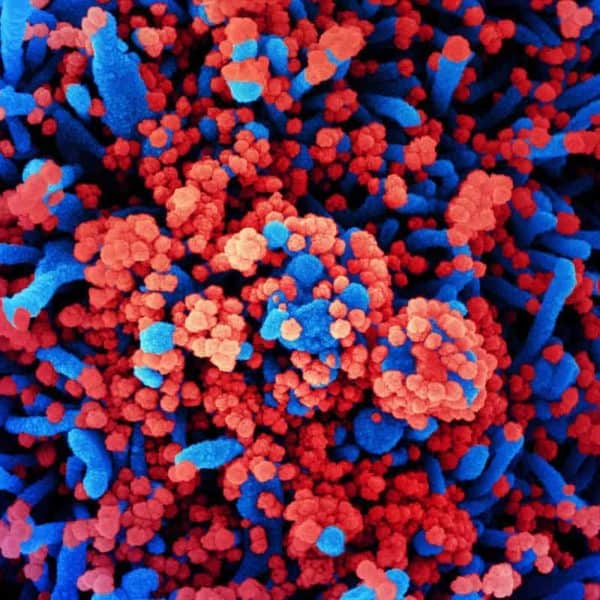A National Institutes of Health clinical trial evaluating the safety and effectiveness of hydroxychloroquine for the treatment of adults with coronavirus disease 2019 (COVID-19) has formally concluded that the drug provides no clinical benefit to hospitalized patients. Though found not to cause harm, early findings in June when the trial was stopped indicated that the drug was not improving outcomes in COVID-19 patients. Final data and analyses of the trial, which was funded by the National Heart, Lung, and Blood Institute (NHLBI), part of NIH, will appear online Nov. 9 in the Journal of the American Medical Association.
The trial, called Outcomes Related to COVID-19 treated with Hydroxychloroquine among Inpatients with symptomatic Disease (ORCHID), began after lab studies and preliminary reports suggested that hydroxychloroquine — commonly used to treat malaria and rheumatic conditions like arthritis — might have promise in treating SARS-CoV-2, the virus that causes COVID-19.
The Prevention and Early Treatment of Acute Lung Injury (PETAL) Clinical Trials Network of NHLBI started the trial in April at 34 hospitals across the United States and enrolled 479 of the expected 510 patients. By June, preliminary evidence indicated hydroxychloroquine was unlikely to offer any benefit.
NIH officials said the careful design, implementation, and oversight of the study was key to its results, as well as the recommendation by a data and safety monitoring board (DSMB) to stop the trial early.
“Having a rigorously designed clinical trial that captured patient-centered, clinically meaningful outcomes was critical to reaching the unequivocal conclusions about the use of hydroxychloroquine in COVID-19. ORCHID shows that hydroxychloroquine does not improve clinical outcomes in hospitalized COVID-19 patients,” said James P. Kiley, Ph.D., director, Division of Lung Diseases at NHLBI. “We hope this clear result will help practitioners make informed treatment decisions and researchers continue their efforts pursuing other possible safe and effective treatments for patients suffering with this disease.”
The ORCHID trial enrolled participants between April 2 and June 19 who were a median age of 57. They included 290 Hispanic and Black participants and 212 female participants. All participants received clinical care as indicated for their condition. Participants were randomly assigned to a treatment group and received 10 doses of either hydroxychloroquine or a placebo over five days. Researchers then assessed each patient’s clinical status 14 days after being assigned to a treatment group. They used a seven-category scale ranging from one (death) to seven (discharged from the hospital and able to perform normal activities). Researchers also measured 12 additional outcomes, including death that occurred 28 days after the participants’ assignment to a treatment group.
At day 14, those who received hydroxychloroquine and those who received a placebo had a similar health status, with most participants in both groups discharged from the hospital and able to perform a range of activities. The number of participants in both treatment groups who died at day 14 was also similar. At day 28, 25 of 241 patients in the hydroxychloroquine group and 25 of 236 patients in the placebo group had died.
“The finding that hydroxychloroquine is not effective for the treatment of COVID-19 was consistent across patient subgroups and for all evaluated outcomes, including clinical status, mortality, organ failures, duration of oxygen use, and hospital length of stay,” said Wesley Self, M.D., M.P.H., emergency medicine physician at Vanderbilt University Medical Center and PETAL Clinical Trials Network investigator who led the ORCHID trial. He also noted that the finding was consistent with similar trials in the United Kingdom and Brazil.
“Our diverse teams of clinicians and research staff worked nimbly, under extremely difficult circumstances to accomplish what NIH and the PETAL Network do best: ‘gold standard’ studies of important questions for patients suffering from life-threatening conditions,” said Samuel M. Brown, M.D., M.S., a critical care physician at Intermountain Healthcare and PETAL Network investigator who helped lead the trial. “While we hoped that hydroxychloroquine would help, even this is an important result as we work together to find effective treatments for COVID-19.”
As of Nov. 2, 2020, the Centers for Disease Control and Prevention has reported more than 9.1 million cases of COVID-19 and more than 230,000 deaths in the United States. Many other randomized clinical trials are currently evaluating the effectiveness and safety of other agents versus a placebo in the urgent race for effective therapies to treat COVID-19.
The ORCHID trial was funded by NIH/NHLBI grants 3 U01 HL123009-06S1, U01HL123009, U01HL122998, U01HL123018, U01HL123023, U01HL123008, U01HL123031, U01HL123004, U01HL123027, U01HL123010, U01HL123033, U01HL122989, U01HL123022, and U01HL123020. Additionally, the research was supported by the National Center for Advancing Translational Sciences Awards UL1TR001102 and UL1TR002541.


